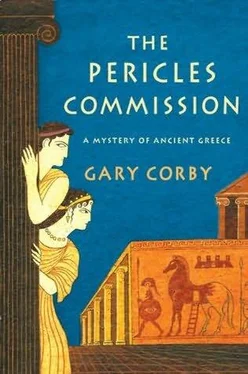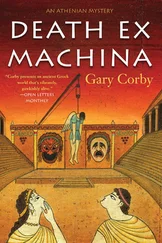Gary Corby - The Pericles Commission
Здесь есть возможность читать онлайн «Gary Corby - The Pericles Commission» весь текст электронной книги совершенно бесплатно (целиком полную версию без сокращений). В некоторых случаях можно слушать аудио, скачать через торрент в формате fb2 и присутствует краткое содержание. Жанр: Исторический детектив, на английском языке. Описание произведения, (предисловие) а так же отзывы посетителей доступны на портале библиотеки ЛибКат.
- Название:The Pericles Commission
- Автор:
- Жанр:
- Год:неизвестен
- ISBN:нет данных
- Рейтинг книги:5 / 5. Голосов: 1
-
Избранное:Добавить в избранное
- Отзывы:
-
Ваша оценка:
- 100
- 1
- 2
- 3
- 4
- 5
The Pericles Commission: краткое содержание, описание и аннотация
Предлагаем к чтению аннотацию, описание, краткое содержание или предисловие (зависит от того, что написал сам автор книги «The Pericles Commission»). Если вы не нашли необходимую информацию о книге — напишите в комментариях, мы постараемся отыскать её.
The Pericles Commission — читать онлайн бесплатно полную книгу (весь текст) целиком
Ниже представлен текст книги, разбитый по страницам. Система сохранения места последней прочитанной страницы, позволяет с удобством читать онлайн бесплатно книгу «The Pericles Commission», без необходимости каждый раз заново искать на чём Вы остановились. Поставьте закладку, и сможете в любой момент перейти на страницу, на которой закончили чтение.
Интервал:
Закладка:
“You’ll have to ask her. I do wish you luck.”
He squared his shoulders and stepped forward.
The door was opened by Euterpe. “Thanks be to the Gods, a real man at last!” She dragged him inside and the door slammed behind them.
Diotima shuddered. “Do you suppose I’ll have to call him Father?”
We walked in silence, taking the long way around to the temple across the Illisos. The Agora was quiet, not a rioter or malcontent to be seen. Diotima said, “Oh, look here, Nicolaos! This is where I hit you in the face with a fish.”
“Yes, and over there is where you knocked over enough olive oil to grease a small army. We’d better not tell the stallholders who you are.”
We laughed. The walk up the Panathenaic Way was pleasant. We stopped at the place where we had fought. It had been cleaned up by the Scythians so you’d never know men had died there.
As we looked around, Diotima asked, “Nicolaos, who do you think murdered Stratonike and those poor nurses?”
“Rizon,” I said confidently.
She nodded. “I think you’re right. He’s one of the few who could have found the buckets of seawater in the dark, and he didn’t want to live with her any more than I did. But, why didn’t you suspect me?”
“I did for a few moments.”
“You did?”
“Yes, but then I realized you would never have murdered the nurses too. Besides, you would have done it much more neatly. All you had to do was offer to relieve the nurses for an afternoon and then finish her in any number of ways. No one would have been in the least surprised if Stratonike had slit her own wrists, for example. No, those killings were vulgar. That describes Rizon, but never you, my dear.”
Diotima hesitated, then turned to face me. “I haven’t forgotten, Nicolaos, what we said when you were in the cell. But…”
“But that was when you thought we’d lost everything, before you had what you wanted.”
“Try to understand, could I leave all this?” She cast her arm around Athens, laid out before us and glorious under Apollo’s rays.
“I understand, Diotima.”
“And anyway, you have your reward from Pericles,” she said. Diotima was nothing if not practical.
I didn’t say a word.
“Nicolaos, you do have your reward from Pericles, don’t you? The house and the income?”
“Pericles is arguing about it. He says that Archestratus revealed himself before I denounced him, so it doesn’t count.”
“Why, that little bastard! I’ll go to him and-”
“It’s all right, Diotima, someone’s going to put pressure on him to pay his just debts.”
“Who?” Diotima demanded.
“His father, Xanthippus.”
“But Xanthippus hates you!”
“Let’s say he’s learned to respect my negotiation skills.”
“That doesn’t mean Pericles will pay you.”
A man approached us. It was Archestratus, son of Archestratus, backed by two tough-looking men. My hand went immediately to the dagger concealed beneath my chitoniskos. Diotima demurely placed her hands before her like a modest maiden, but I knew she had one clasped over her priestess pouch, in which lay the sacrificial knife she had used to cut the throat of this man’s father.
“Ah, I find you at last, Nicolaos, son of Sophroniscus. We are mortal enemies, you and I.”
“Why?” I asked.
“You killed my father.”
I did not look to Diotima. “He died fighting alongside Xanthippus and Pericles.”
“That is the story being put out for the ignorant people. You and I know better. Know, Nicolaos, that I will do everything in my considerable power to make your life a living misery until I send you down to Hades.”
He nodded politely to Diotima and went on his way.
Diotima said, “That reminds me, Nicolaos. You don’t need to worry about Pericles paying you.” She reached into her pouch and pulled out a short piece of board.
“Is that…?”
“I found it around the neck of Archestratus after I cut his throat. If we take along witnesses so they can’t possibly argue, Antisthenes and Archestratus will have no choice but to pay us out.”
I pulled out my half of the banking token and put it against hers. They fitted together perfectly.
We kissed.
Author’s Note
This story really happened, though not, perhaps, precisely as it appears in the book. There really was an Ephialtes. He really did create the world’s first democracy. He really was murdered days later.
Democracy began in the middle of a blind spot in written history. The Persian Wars had been fought twenty years before. Herodotus recorded them. The next great war was the long and destructive fight between Athens and Sparta, which Thucydides recorded. Democracy began in the gap between, when no one was recording much of anything. The longest record is a few paragraphs in a book called The Athenian Constitution, which is usually attributed to Aristotle, but quite possibly was cobbled together by a couple of his students. Here’s what it says (from the Penguin Classics edition): Ephialtes son of Sophonides became champion of the people, a man who appeared to be uncorrupt and upright in political matters. He attacked the Council of the Areopagus. First, he eliminated many of its members, bringing them to trial for their conduct in office. Then in the archonship of Conon he took away from the Council all the accretions which gave it its guardianship of the constitution, giving some to the Council of Five Hundred and some to the People and the jury-courts… Ephialtes too was removed by assassination not long afterwards, through the agency of Aristodicus of Tanagra.
Later in the same book it says: “They took down from the Areopagus hill the laws of Ephialtes and Archestratus about the Council of the Areopagus…” From which we know a legal technician by the name of Archestratus had been assisting Ephialtes.
You can see how the characters in the story come together: Ephialtes, the reformer; Archestratus, the lawyer; Conon, the archon; and Aristodicus, the hit man, are all there to be found in the ancient sources. If you made this stuff up, people wouldn’t believe it.
When Ephialtes was finished, the Ecclesia had the sole right to decide all policy, domestic and foreign. Every citizen, irrespective of who they were, had exactly the same vote, and exactly the same inalienable right to speak before the people. It was the world’s first democracy.
At that moment, Western civilization began.
There are other dates you could argue for, but it’s hard to go past this one: a sovereign state with one man one vote, free speech for every citizen, written laws and equality before the law, with open courts and trial by jury. Modern drama was being invented at the same time as democracy. Aeschylus was writing his plays; two young men called Sophocles and Euripides were beginning to write their own. Anaxagoras was developing a theory of matter in which everything was made of infinitesimal particles; it was the beginning of atomic theory. Herodotus was traveling the world, writing his book, and in the process founding both history and anthropology. A young kid called Socrates was outside somewhere, playing in the street, and on the island of Kos, a baby called Hippocrates was born to a doctor and his wife.
Within days of pushing through his reforms, Ephialtes was murdered. The world’s first political assassination in a democracy had happened within days of the world’s first democracy, and the victim was the man who created it. The assassin was caught, but Aristodicus was a hired killer. The men behind the plot were never discovered.
It’s difficult to comprehend from our distance what Athens must have gone through. The United States was traumatized when JFK was assassinated, imagine the same thing happening when your newly minted democracy is less than a month old. Anything might have happened. The old men of the Areopagus might have gathered troops and resumed control of Athens. The new government might have collapsed. Civil war might have broken out.
Читать дальшеИнтервал:
Закладка:
Похожие книги на «The Pericles Commission»
Представляем Вашему вниманию похожие книги на «The Pericles Commission» списком для выбора. Мы отобрали схожую по названию и смыслу литературу в надежде предоставить читателям больше вариантов отыскать новые, интересные, ещё непрочитанные произведения.
Обсуждение, отзывы о книге «The Pericles Commission» и просто собственные мнения читателей. Оставьте ваши комментарии, напишите, что Вы думаете о произведении, его смысле или главных героях. Укажите что конкретно понравилось, а что нет, и почему Вы так считаете.












